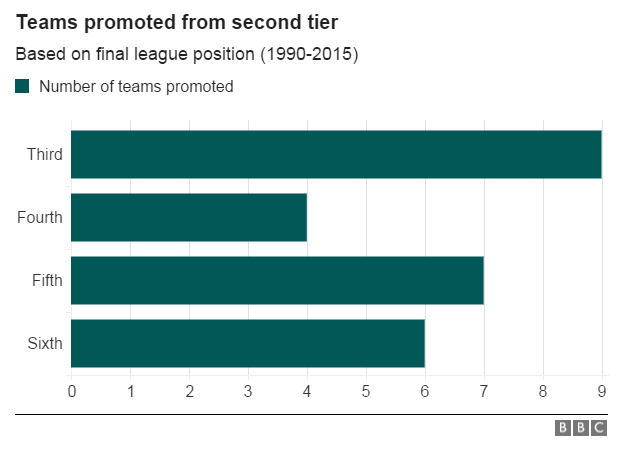Football League play-offs: How do you win them?
- Published

Norwich beat Middlesbrough 2-0 at Wembley to win the 2015 Championship play-offs
The Football League play-offs begin on Thursday and thousands of fans around England will be cheering their team on, hoping they can achieve promotion at Wembley by the end of May.
The 12 clubs involved are three games away from winning promotion, but what does it take to go up through the fiercely-contested end-of-season tournament?
BBC Sport looked at 26 years of statistics to bring you some answers.
Does it matter where you finish?

Since the 1989-90 season - when the current Football League play-off format of four teams from the same league competing to play a one-leg final at a neutral venue was introduced - nine sides finishing as the top qualifier for the play-offs have won promotion to the top flight.
That may bode well for Brighton, who finished third in the Championship in 2015-16.
Does scoring first give you an advantage?

Huddersfield have twice won the third-tier play-offs after scoring first in the semi-final first leg, first in 1995 and then again in 2012
A quarter of second-tier teams who score first in the play-off semi-final first leg have gone on to reach the final and win promotion to the top flight.
Teams start with a one-in-four chance of being promoted before a ball is kicked, which would suggest that scoring the first goal of a semi-final is not that important at all.
In League One, it is even less important. From 52 semi-final first-leg fixtures, teams who scored first went through to the final on only 18 occasions (35%), while just 11 of those (21%) went on to win in the final.
Meanwhile in League Two, 58% of teams who score first in the fourth-tier play-off semi-final first leg go on to reach the final.
A home advantage?
Brighton missed out on automatic promotion to the Premier League by failing to beat Middlesbrough in their final game of the season.
The Seagulls face Sheffield Wednesday at Hillsborough on Friday, but could they benefit from playing Monday's second leg at home?
In the current format from 1989-90 onwards, teams from the Championship who play their semi-final second leg at their home ground have won on 31 of 52 occasions.
Of those second-leg winners, 24 teams have got through to the final while 13 teams have gone on to win the second-tier play-off final at Wembley.

Bolton Wanderers celebrate winning the 1994-95 Division One play-off final
But what if you have lost the first leg away from home? How often have teams used their second-leg home advantage to turn their semi-final around and then win the play-off final? The answer is "not very".
In the Championship, it has only happened once. Bolton Wanderers lost their 1994-95 Division One play-off semi-final first leg 2-1 at Wolves but won 2-0 after extra-time in the return leg at Burnden Park, before beating Reading 4-3 in the play-off final at Wembley.
In League One, West Bromwich Albion (1992-93), Gillingham (1999-00), Peterborough (2010-11) and Yeovil (2012-13) have won the play-offs after losing their first leg away from home.
Only Blackpool (1991-92), Plymouth (1995-96), Colchester (1997-98) and Scunthorpe (1998-99) have been able to repeat the feat in League Two.
Goals for glory

Your team battles their way to the play-off final and thousands of your fans, draped in the colours of their team, descend on Wembley - does scoring first put your side in the driving seat?
In a word, yes. Teams who score first in Championship play-off finals have won on 20 of 26 occasions, while it is 21 from 26 in League One finals and 20 out of 26 in League Two.
Interestingly, there is very little in the way of a fightback in these instances. Usually, when one team takes the lead in a play-off final, the other team will not score.
In the current format, 15 of 26 second tier play-off finals have seen just one team score, while it is 14 of 26 in the third tier and also 14 of 26 in the fourth.
As promotion gives second-tier clubs a huge financial advantage, play-off finals have been nervy affairs of late. Seven of the last 10 Championship play-off finals have resulted in just one team getting on the scoresheet.
Coming soon: We're launching a new BBC Sport newsletter ahead of the Euros and Olympics, bringing all the best stories, features and video right to your inbox. You can sign up here., external
- Published20 June 2016

- Published7 June 2019

- Published2 November 2018
